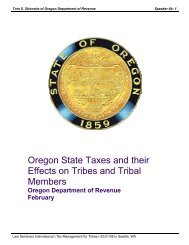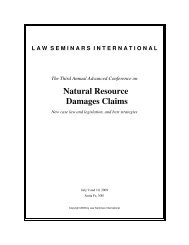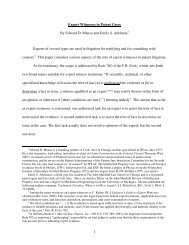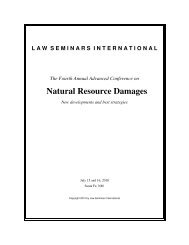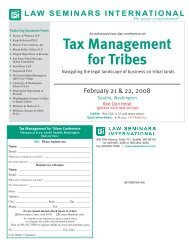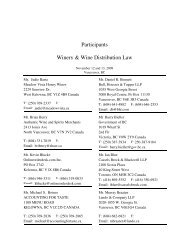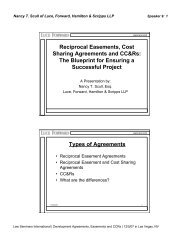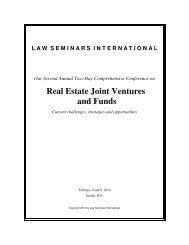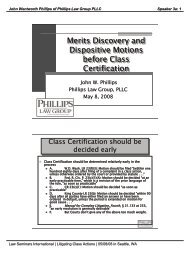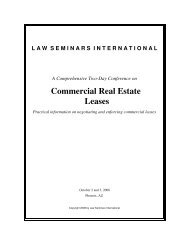Issues Relating to Leases on Native American Reservations
Issues Relating to Leases on Native American Reservations
Issues Relating to Leases on Native American Reservations
Create successful ePaper yourself
Turn your PDF publications into a flip-book with our unique Google optimized e-Paper software.
Speaker 17: D<strong>on</strong> J. Miner of Fennemore Craig P.C. Page 2<br />
The following principles are central <str<strong>on</strong>g>to</str<strong>on</strong>g> all aspects of <strong>Native</strong> <strong>American</strong> law 1 :<br />
1. An Indian nati<strong>on</strong> possesses powers of a sovereign state and<br />
enjoys a government-<str<strong>on</strong>g>to</str<strong>on</strong>g>-government relati<strong>on</strong>ship with the United States.<br />
2. The federal government has broad authority <str<strong>on</strong>g>to</str<strong>on</strong>g> regulate Indian<br />
affairs, subject <str<strong>on</strong>g>to</str<strong>on</strong>g> c<strong>on</strong>stituti<strong>on</strong>al c<strong>on</strong>straints.<br />
3. State authority in Indian affairs is limited.<br />
4. <strong>Native</strong> <strong>American</strong> tribes c<strong>on</strong>stitute separate governmental<br />
authorities with regula<str<strong>on</strong>g>to</str<strong>on</strong>g>ry authority.<br />
III.<br />
SOURCES<br />
Researching a <strong>Native</strong> <strong>American</strong> law issue may require c<strong>on</strong>sulting a broad variety<br />
of sources including: the United States C<strong>on</strong>stituti<strong>on</strong>, principles of internati<strong>on</strong>al law,<br />
treaties with individual <strong>Native</strong> <strong>American</strong> tribes, federal statutes and regulati<strong>on</strong>s,<br />
executive orders, and judicial opini<strong>on</strong>s. It is important <str<strong>on</strong>g>to</str<strong>on</strong>g> keep in mind that each tribe has<br />
a unique relati<strong>on</strong>ship with the United States government. Laws that affect <strong>on</strong>e tribe may<br />
not necessarily affect all tribes. See, e.g., 25 U.S.C. § 416(a) ("Any c<strong>on</strong>tract, including a<br />
lease, affecting land within the Salt River Pima-Maricopa Indian Reservati<strong>on</strong> may<br />
c<strong>on</strong>tain a provisi<strong>on</strong> for the binding arbitrati<strong>on</strong> of disputes arising out of such c<strong>on</strong>tract.")<br />
Sources that pertain <str<strong>on</strong>g>to</str<strong>on</strong>g> leasing tribal property include the following:<br />
1. 25 U.S.C. § 415 et seq. (Indian L<strong>on</strong>g-Term Leasing Act)<br />
2. 25 CFR § 162 et seq. (Indians, <str<strong>on</strong>g>Leases</str<strong>on</strong>g> and Permits)<br />
3. Each tribe’s c<strong>on</strong>stituti<strong>on</strong>, codes and ordinances. Tribal codes and<br />
ordinances often functi<strong>on</strong> much like a municipality or a county.<br />
4. Case law of federal courts, especially the Supreme Court.<br />
1 The general principals outlined above are identified in COHEN'S HANDBOOK OF FEDERAL INDIAN<br />
LAW (2005), 1 - 3. Chapter 4 of COHEN'S ("Indian Tribal Governments") provides a detailed discussi<strong>on</strong><br />
of Indian tribal governments and their relati<strong>on</strong>ship <str<strong>on</strong>g>to</str<strong>on</strong>g> and interacti<strong>on</strong> with federal and state governments.<br />
Law Seminars Internati<strong>on</strong>al | Commercial Real Estate <str<strong>on</strong>g>Leases</str<strong>on</strong>g> | 4/24/07<br />
2




